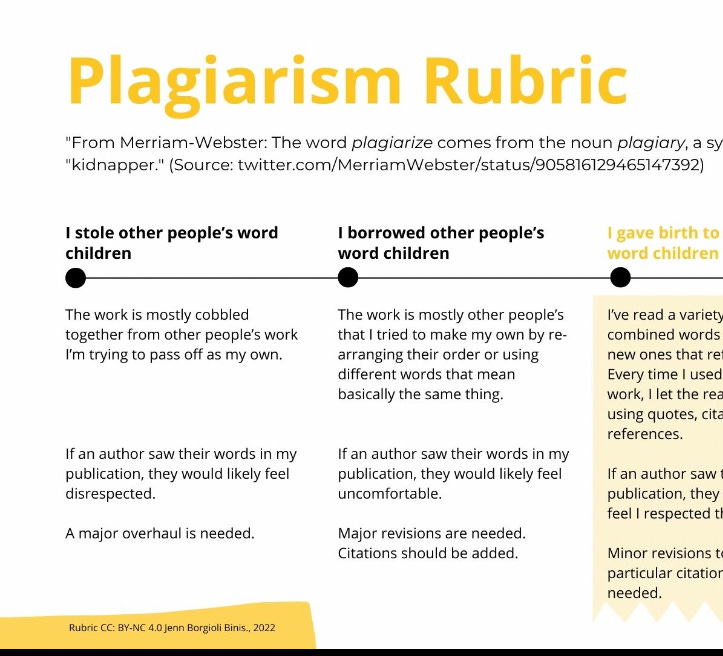Academic Integrity
The mature plagiarist is shunned and shamed publicly when caught, sometimes academically punished or expelled from universities after a hearing. “I didn’t know it was wrong,” I’ve heard my own students say.
Educators have a reputation as strong monitors of plagiarism, recognizing that such behavior shows up for different reasons and in different ways depending on developmental level. Most acknowledge that plagiarists don’t become idea thieves over night. Early intervention is crucial.
A colleague sent me the following rubric intended for use in middle school. Ignorance of the law can’t be an excuse after students are taught the law:
The continuum from stealing to borrowing to creating your own ‘word children’ likely comes from the Latin root ‘plagiarius,’ a kidnapper.
I used an in class writing exercise when I taught middle school English to drive home the links between plagiarism and paraphrasing. Students would read and study a short passage. They would then write the content of the passage in their own words.
“If you try to pass the paraphrase off as your own work, you’ve plagiarized,” I’d tell them. “Document the source and you’ve done library research.”
Online courses and programs as well as secondary and university education has seen a dramatic amplification of technology implicating plagiarism.1 Text Spinning2 tools are available to fabricate undetectable plagiarized passages from original passages written by another. Turnitin and a host of online tools flag plagiarism for instructors.
Then there are the AI auto assists available well beyond predictive algorithms and spell check. Grammar checks, style massagers, idea generators—all of these devices make writing more difficult to learn to do well. I’m not sure conceptually whether using the words of a bot is plagiarism since bots don’t have children, but it strikes me as problematic.
Plagiarism I believe is costly not just because it crushes the idea of intellectual integrity that sits at the heart of academic freedom. It also sucks the life out of literacy learning. In some ways, Graves put his finger on a root cause: Writer’s Welfare.
I’ve always found when I got stuck it was because I didn’t have anything to say right then.
https://www.theatlantic.com/education/arccourses/413770
https://ctl.wiley.com/text-spinning-tools/



